SendPulse Review: Multi-Channel Marketing Platform Overview
Capterra, G2, Trustpilot, and Reddit to create an objective evaluation. Learn more about our review methodology
SendPulse caught my attention because it promises something most email marketing tools don’t: everything in one place. Email, SMS, chatbots, web push notifications, even a CRM. Sounds too good to be true? Maybe. But after digging into what users actually say about it, I found some interesting patterns.
The platform serves over 5 million users and offers a genuinely useful free plan — 15,000 emails monthly, which beats most competitors. Whether it’s right for your business depends on what you’re trying to accomplish and how much complexity you can handle.
What is SendPulse?
Think of SendPulse as the Swiss Army knife of marketing tools. Instead of juggling separate platforms for email, SMS, and chatbots, you get everything under one roof. The company started as an email service but evolved into something bigger — a full marketing automation platform that connects all your customer touchpoints.
What makes it different? Most email tools focus on, well, emails. SendPulse lets you build workflows that might start with an email, follow up with an SMS, then trigger a chatbot conversation if someone visits your website. It’s like having a conversation with customers across multiple channels without losing track of where you left off.
The platform includes a CRM, landing page builder, and even tools for creating online courses. Honestly, it feels like they kept adding features until they covered every marketing scenario imaginable. Sometimes that’s brilliant. Sometimes it’s overwhelming.
SendPulse Key Features
The email editor works like most drag-and-drop builders — you drag elements around until things look right. No coding required. They give you 130+ templates to start with, and most look modern enough that you won’t embarrass yourself.
Where SendPulse shines is deliverability. They handle the technical stuff (SPF, DKIM, DMARC) that keeps your emails out of spam folders. Users consistently report better open rates after switching from other platforms, with some seeing 50% improvements. That’s the kind of number that makes you pay attention.
The segmentation gets pretty detailed. You can slice your list by behavior, purchase history, email engagement — whatever data you have. Email A/B testing is built in, though it’s not as sophisticated as what you’d get with premium platforms.
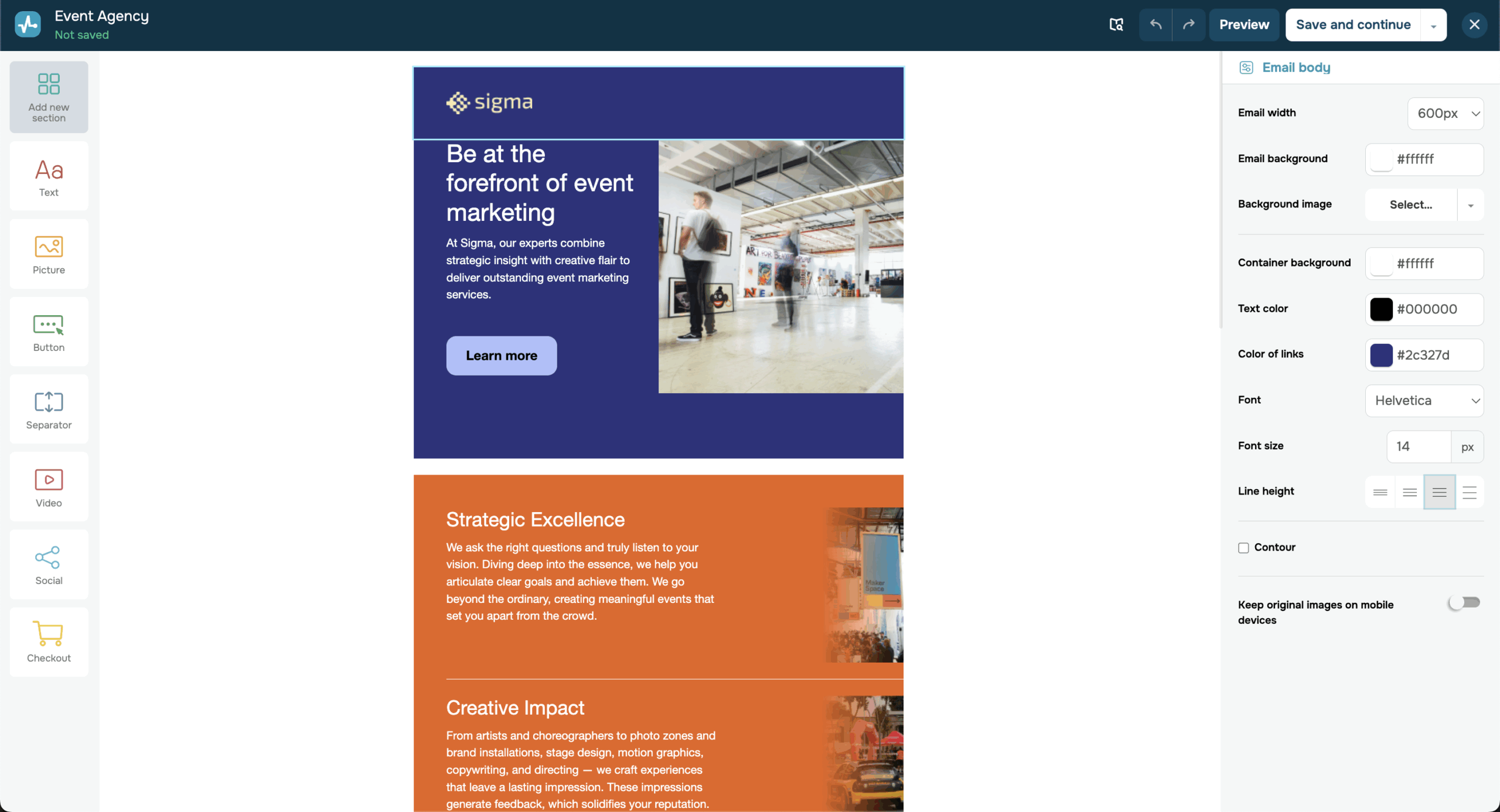
Here’s where opinions split. SendPulse offers plenty of templates, and they’re mobile-friendly by default. But if you’re used to platforms with more design flexibility, you might feel constrained. The customization options are solid for most businesses, just not groundbreaking.
The drag-and-drop editor handles the basics well. Change colors, swap images, adjust text. You can save your own templates once you’ve built something you like. Dynamic content works too — names, locations, purchase history can all populate automatically.
Some users complain about slower loading when templates get complex. Not a dealbreaker, but worth knowing if you’re building elaborate designs.
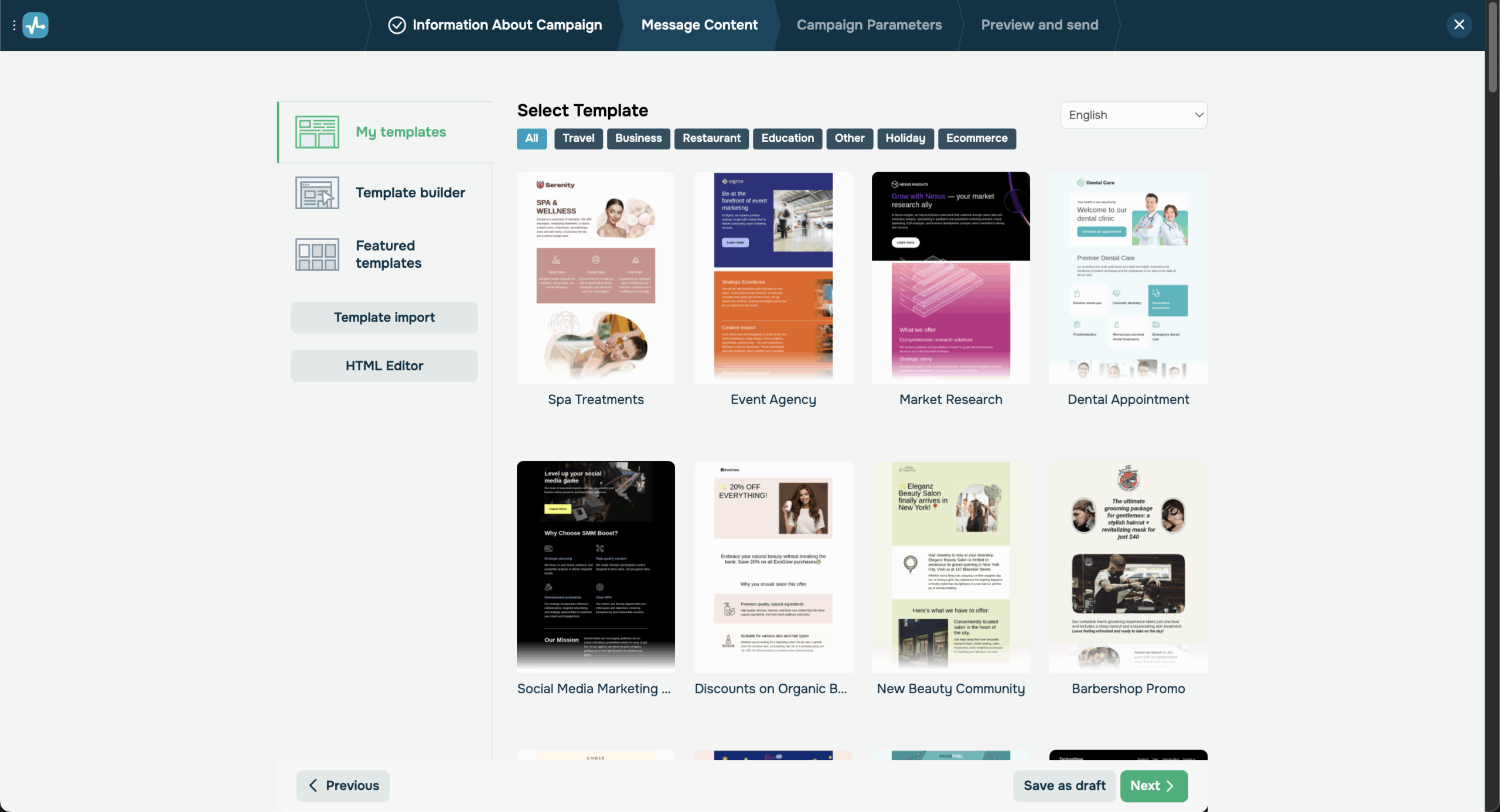
This is where SendPulse gets interesting. You can build workflows that span multiple channels — start with an email, add an SMS follow-up, trigger a web push notification. Most email platforms can’t do that without expensive add-ons.
The visual workflow builder makes sense once you get used to it. Drag triggers and actions around, connect them with lines, set timing delays. Pre-built templates cover common scenarios like welcome sequences and abandoned cart recovery, so you don’t start from scratch.
Does it match ActiveCampaign’s sophistication? Not quite. But for most businesses, it covers the workflows you actually need. The learning curve exists, especially if you’ve never built automation before.
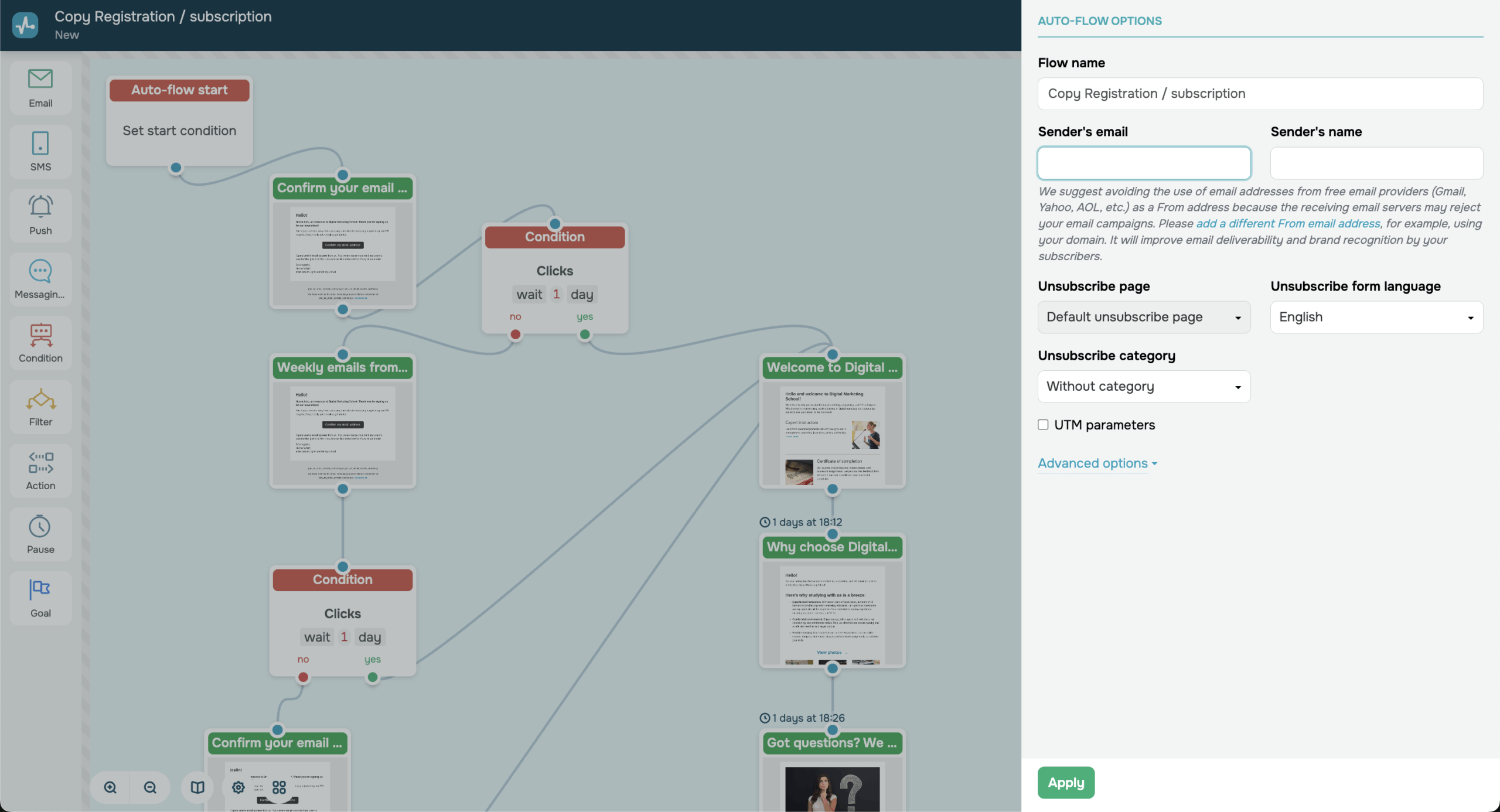
Contact management does what you’d expect. Import from CSV files, sync with other tools, automatically remove bounces and unsubscribes. The system handles duplicates reasonably well, though bulk editing could be smoother.
List segmentation gets granular. Tag people based on behavior, create dynamic segments that update automatically, track engagement over time. GDPR compliance tools are built in, which European businesses appreciate.
One frustration: some users want more control over team permissions. If you have multiple people managing lists, the access controls feel basic compared to enterprise platforms.
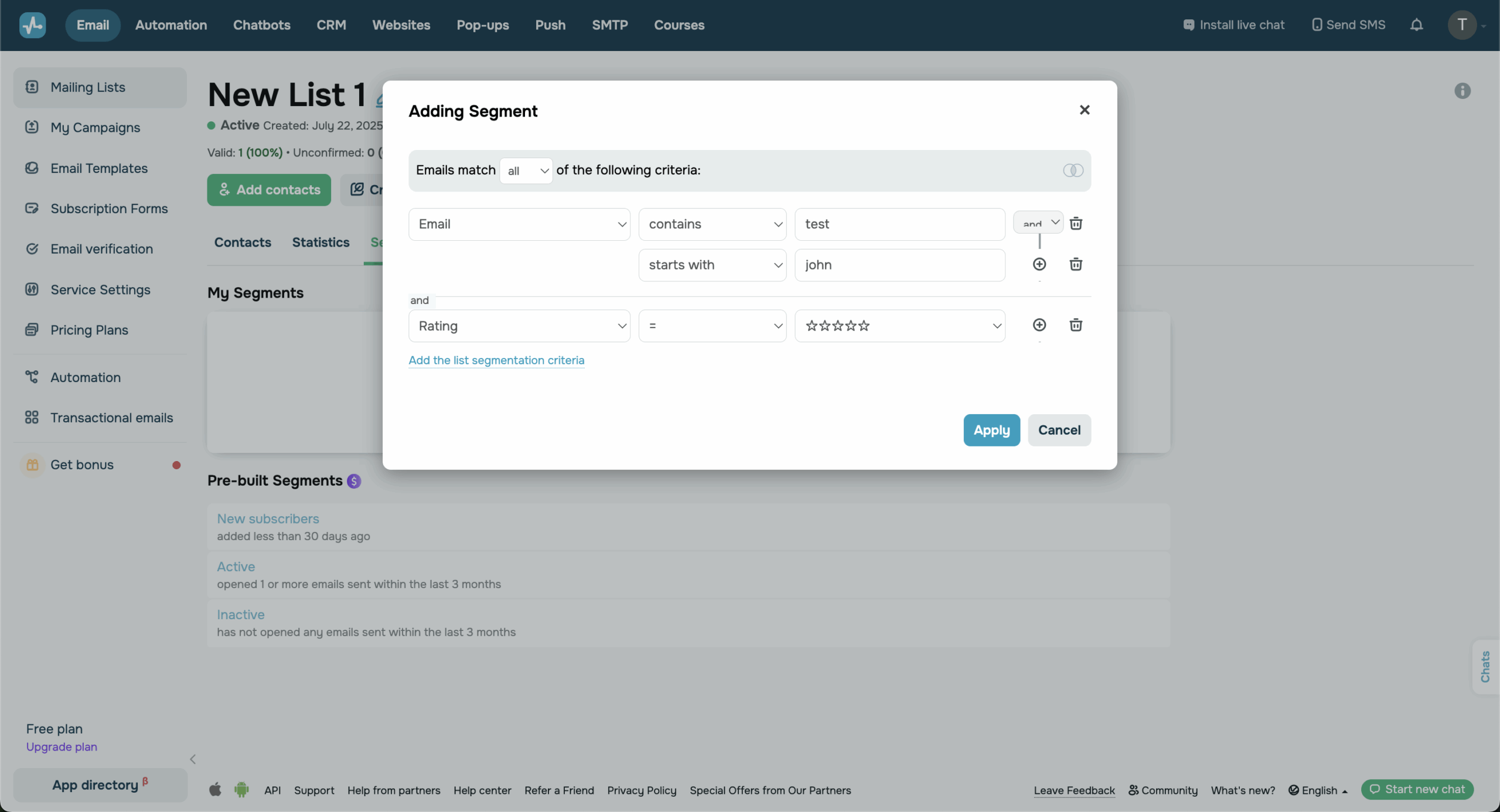
The landing page builder works, but don’t expect Unbounce-level sophistication. You get responsive templates and the usual drag-and-drop editing. Forms can be embedded anywhere or displayed as pop-ups with targeting rules.
Integration with the email system is seamless — capture a lead on a landing page, and they automatically enter your email workflows. The CRM connection means you’re not losing data between systems.
A/B testing for landing pages exists but feels like an afterthought. If conversion optimization is crucial for your business, you might want specialized tools.
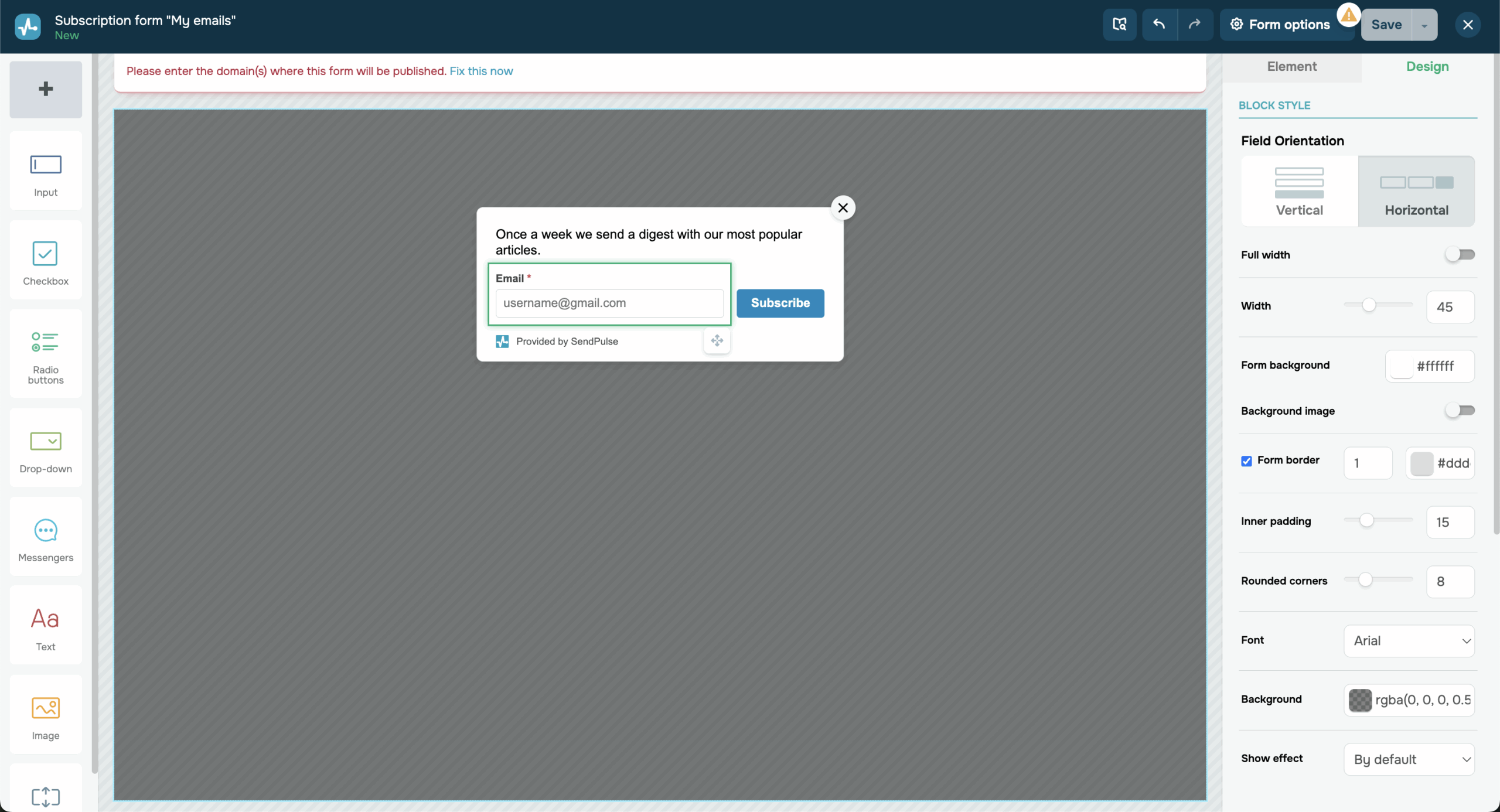
Standard email metrics are all here — opens, clicks, bounces, unsubscribes. The cross-channel reporting is more unique, showing how people move between email, SMS, and other touchpoints. Revenue tracking helps you connect campaigns to actual sales.
The dashboard gives you the big picture without drowning you in data. Custom reports can be scheduled and shared with your team. Export options cover the usual formats.
Advanced analytics users might want more. The reporting is solid for most businesses but lacks the depth that enterprise teams often need.
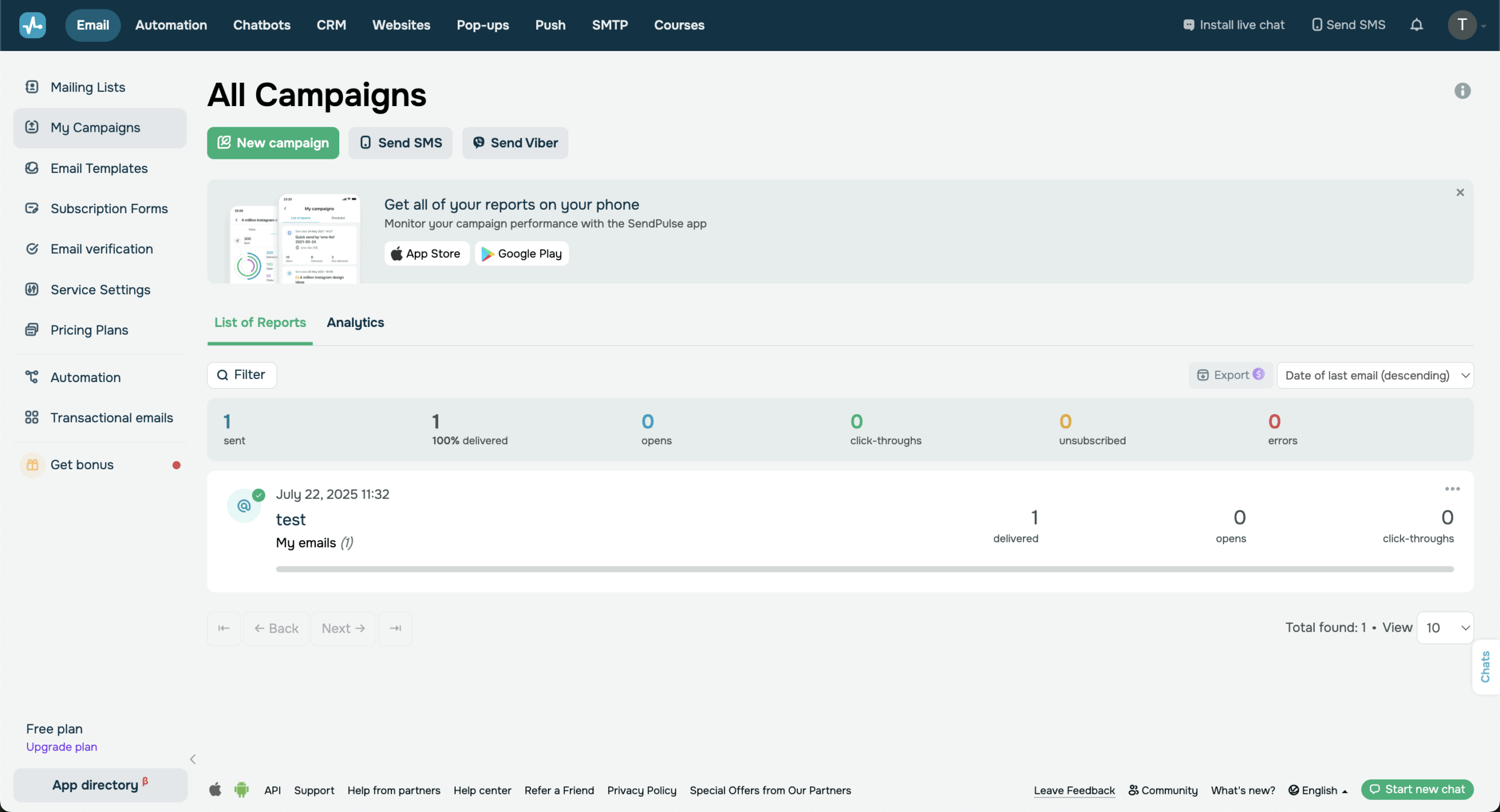
SendPulse connects with about 40 popular platforms — Shopify, WooCommerce, WordPress, Salesforce, the usual suspects. The API is well-documented if you need custom integrations.
Zapier support opens up hundreds of additional connections. Ecommerce integrations handle abandoned cart campaigns and post-purchase sequences automatically. SMTP service for transactional emails is included.
The integration list covers most needs but isn’t exhaustive. If you use niche tools, you might need workarounds.
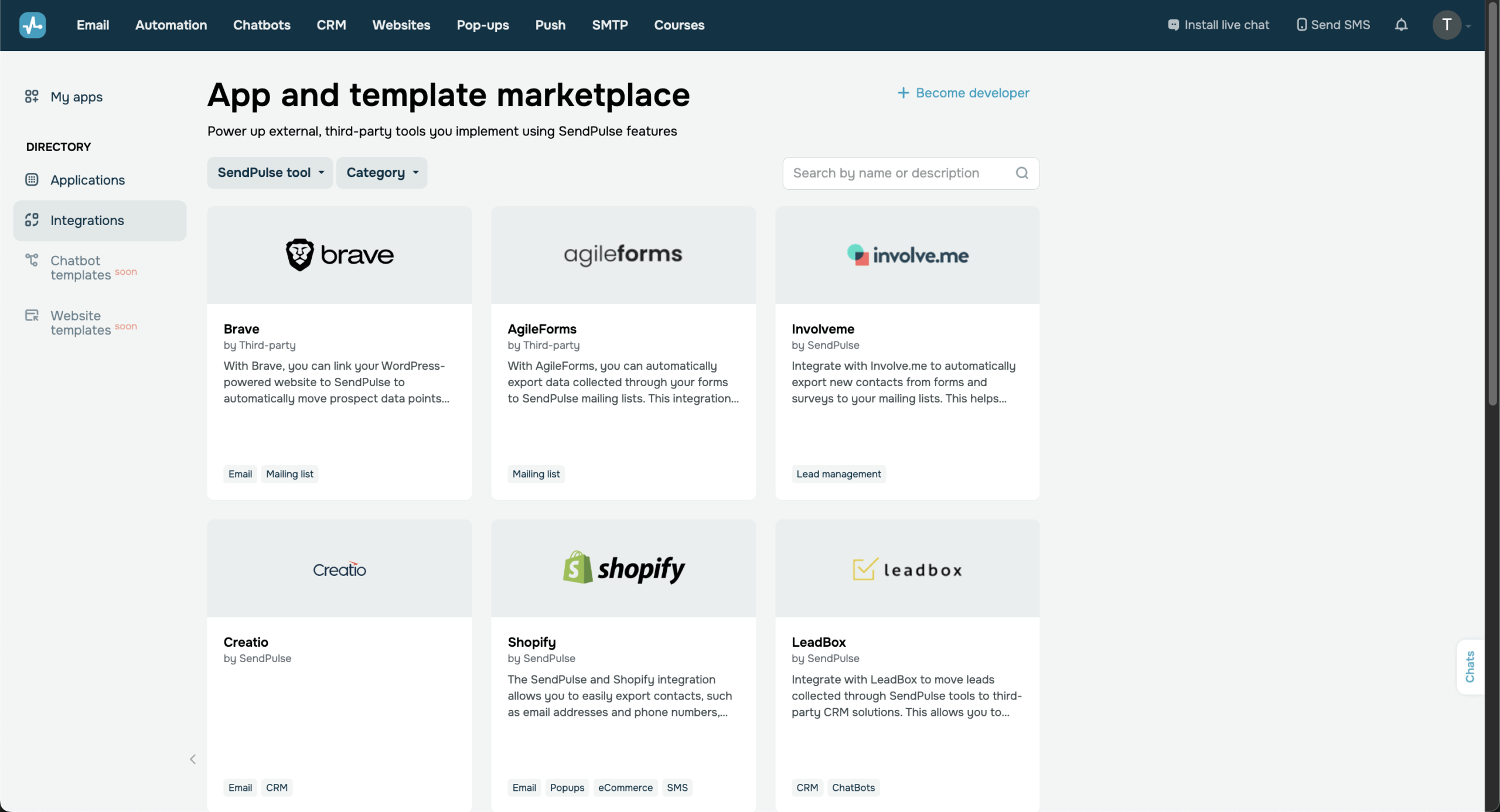
24/7 support across live chat, email, and phone. Response times are generally quick, and the quality is better than many budget platforms. The knowledge base is extensive, and SendPulse Academy offers structured training.
Users consistently praise the support team for actually helping rather than deflecting. That’s rarer than it should be in this industry. Enterprise customers get dedicated account management.
Peak period support can get slower, and some advanced features lack detailed documentation. But overall, support quality exceeds expectations for the price point.
SendPulse distinguishes itself as a comprehensive SendPulse marketing and transactional solution, offering both services within one platform.
Their SMTP service provides reliable SMTP relay for sending transactional emails, while the Transactional Email API offers RESTful endpoints for seamless developer integration through the SendPulse API. Notably, their free plan includes up to 12,000 transactional emails monthly, making it accessible for startups.
SendPulse transactional emails benefit from separate infrastructure distinct from marketing sends, ensuring optimal deliverability. The platform includes email verification, variable support for personalizing content with dynamic data, and comprehensive delivery tracking monitoring opens, clicks, and status.
Additional features include webhook notifications for real-time alerts, template management for storing transactional email templates, and affordable pricing competitive across all volume tiers.
SendPulse Pricing Plans and Value
Price
Subscribers
Monthly Emails
Key Features
Free
$0
Up to 500
15,000
Basic templates, automation, web push, basic reporting
Standard
$9.85/month
Up to 2,500
Unlimited
Remove branding, advanced automation, A/B testing
Pro
$21/month
Up to 5,000
Unlimited
Advanced segmentation, send-time optimization, priority support
Enterprise
Custom
500,000+
Unlimited
Dedicated IP, custom integrations, dedicated account manager
The free plan is genuinely useful — 15,000 emails monthly to 500 subscribers beats most competitors. You get core automation features and web push notifications without paying anything. Not bad for testing the waters.
Paid plans scale reasonably as your list grows. Pay-as-you-go options work for irregular senders. The pricing stays competitive compared to similar platforms, often running 2-3x cheaper than premium alternatives.
Enterprise pricing kicks in around 500,000 subscribers. By then, you probably need dedicated IPs and custom integrations anyway.
SendPulse Pros and Cons
- Generous free plan that actually works
- Multi-channel automation in one platform
- Much cheaper than premium competitors
- 24/7 support that helps
- Built-in CRM and landing pages
- No coding required anywhere
- Template customization feels limited
- Learning curve for advanced features
- Deliverability needs optimization sometimes
- Fewer integrations than enterprise platforms
- Chatbots aren’t as smart as specialist tools
- Interface feels dated in places
Pros
The value proposition is hard to ignore. You get sophisticated automation features at a fraction of what ActiveCampaign or HubSpot charges. The multi-channel approach eliminates tool switching — build one workflow that handles email, SMS, and web push together.
Support quality surprises people. Many budget platforms phone it in, but SendPulse actually helps solve problems. The free plan lets you test everything before committing money, which builds confidence.
Users consistently mention cost savings of 50-70% compared to premium platforms while keeping similar functionality. That’s significant money for growing businesses.
Cons
Template design flexibility lags behind specialized platforms. If you need pixel-perfect emails that match complex brand guidelines, you might feel constrained. The automation builder, while powerful, overwhelms newcomers.
Deliverability is good but not perfect. Users who ignore best practices sometimes see emails land in spam folders. The chatbot features work but lack the conversational AI sophistication of dedicated platforms like ManyChat.
Some interface areas feel older than they should. Not broken, just not as polished as newer platforms.
Should You Choose SendPulse?
Best For
Consider Alternatives If
Small businesses wanting affordable automation
You need enterprise-level customization
E-commerce stores with multi-channel needs
Chatbot conversations are your main focus
Startups testing marketing automation cheaply
Email design flexibility is crucial
Online course creators needing integrated tools
Advanced analytics beyond basics required
Teams wanting to consolidate marketing tools
Complex enterprise integrations necessary
Who SendPulse is Perfect For
Small businesses get the most value here. You need email marketing, maybe some SMS, possibly chatbots — but you don’t want to pay enterprise prices or manage multiple tools. SendPulse covers all bases affordably.
E-commerce works particularly well. Abandoned cart emails, post-purchase sequences, SMS notifications for shipping updates — all connected in one system. Online educators love the course creation tools alongside email marketing.
Budget-conscious businesses can test sophisticated strategies without breaking the bank. The free plan actually lets you accomplish real marketing goals, not just basic email blasts.
Who Should Consider an Alternative
Enterprise teams needing extensive customization or complex integrations might outgrow SendPulse quickly. If chatbots are central to your strategy, specialized platforms offer smarter conversation capabilities.
Design-focused brands requiring pixel-perfect emails might prefer platforms with more template flexibility. Teams needing advanced analytics beyond standard metrics should look at enterprise-focused solutions.
Very large organizations often need dedicated infrastructure and white-glove service that SendPulse doesn’t provide at the same level as premium platforms.
SendPulse User Experience and Reputation
Users on G2 consistently mention improved deliverability and open rates after switching to SendPulse. The automated send-time optimization gets credit for these improvements. Cost-effectiveness comes up frequently — people appreciate getting premium features without premium prices.
Support quality gets regular praise. Users note that representatives actually solve problems rather than reading scripts. The multi-channel automation capabilities impress businesses consolidating their marketing stack.
Common complaints include occasional interface lag and requests for more template customization. Some enterprise users want more sophisticated automation logic, though most acknowledge excellent value for money.
Capterra users emphasize ease of use and quick learning curves. First-time email marketers often successfully launch campaigns within hours of signing up. The educational resources and tutorials get consistent positive feedback.
The generous free plan influences many initial decisions and ongoing satisfaction. Users appreciate being able to test extensively before upgrading. Team collaboration features work well for small businesses.
Areas for improvement include template variety and occasional email approval delays during compliance reviews. Some users want more granular team permissions and better bulk editing tools.
Trustpilot reviews highlight reliability and support responsiveness. Long-term users praise continuous feature improvements and helpful customer service. Multi-channel automation gets frequent mentions, especially from e-commerce users.
Users consistently recommend the platform for small to medium businesses seeking comprehensive automation. The overall satisfaction rate stays high across different business types and use cases.
Improvement requests focus on chatbot limitations and more advanced analytics. But the general sentiment remains positive, with users feeling they get good value for their investment.
SendPulse Compared to Top Alternatives
SendPulse wins on features — SMS, web push, chatbots, and CRM capabilities that Sender simply doesn’t have. The automation workflows are more sophisticated, supporting cross-channel triggers that create complex customer journeys.
Sender excels at email template design and offers a more intuitive interface for basic campaigns. Their templates look more modern and provide better customization options. The user experience feels smoother for simple email marketing tasks.
Pricing favors SendPulse for businesses needing multi-channel marketing. Sender might be cheaper for email-only campaigns, but most growing businesses eventually need the additional channels SendPulse provides.
Both deliver good email performance, but SendPulse’s comprehensive approach makes it more future-proof as your marketing needs evolve.
The cost difference is significant. SendPulse offers unlimited emails on paid plans while Mailchimp’s pricing escalates quickly with subscriber growth. SendPulse includes SMS and chatbots that Mailchimp charges extra for or doesn’t offer.
Mailchimp has better brand recognition and a more polished interface. Their template library is larger and e-commerce integrations run deeper. The user experience feels more refined, especially for beginners.
Free plan comparison heavily favors SendPulse — 15,000 monthly emails versus Mailchimp’s more restrictive offerings. Advanced users often prefer SendPulse’s automation capabilities and cost structure.
Casual users might find Mailchimp’s simplicity appealing despite higher costs. Serious marketers usually choose SendPulse for better value and functionality.
ActiveCampaign offers more sophisticated automation and CRM features. Their lead scoring, deal tracking, and conditional logic appeal to sales-focused organizations. Segmentation and personalization options are more granular.
SendPulse costs roughly half as much while providing similar core functionality for most small businesses. The multi-channel approach includes web push and chatbots that ActiveCampaign doesn’t offer natively.
Learning curves favor SendPulse for basic users, while ActiveCampaign requires more training investment but offers greater scalability for complex operations. Analytics and reporting are more advanced in ActiveCampaign.
The choice typically comes down to budget versus advanced features. SendPulse works for most businesses; ActiveCampaign serves those needing enterprise-level sophistication.
Bottom Line
SendPulse delivers solid value for businesses wanting comprehensive marketing automation without enterprise pricing. The multi-channel approach successfully combines email, SMS, web push, and chatbots into one coherent system. This reduces complexity and costs compared to managing separate tools.
The generous free plan and competitive pricing make sophisticated marketing strategies accessible to smaller businesses. E-commerce companies and online educators particularly benefit from the integrated approach to customer engagement across multiple touchpoints.
Advanced users might hit some limitations in customization and enterprise features. But for most businesses prioritizing practical automation over premium sophistication, SendPulse offers a compelling balance of functionality, affordability, and ease of use.
Choose SendPulse if you want cost-effective multi-channel automation with strong support. Look elsewhere if you need enterprise customization, advanced analytics, or specialized capabilities that justify premium platform investments.
- Hands-on testing across multiple email marketing tools
- Fair comparisons using a unified evaluation process
- Insights verified with real user reviews from trusted sources
- No sponsorships or affiliate ties
- Clear, unbiased scoring and methodology

